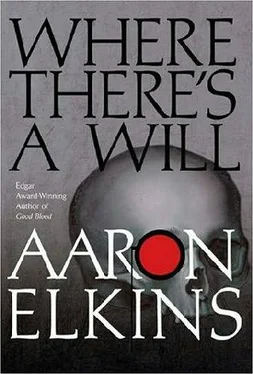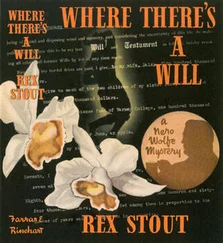Aaron Elkins - Where there's a will
Здесь есть возможность читать онлайн «Aaron Elkins - Where there's a will» весь текст электронной книги совершенно бесплатно (целиком полную версию без сокращений). В некоторых случаях можно слушать аудио, скачать через торрент в формате fb2 и присутствует краткое содержание. Жанр: Классический детектив, на английском языке. Описание произведения, (предисловие) а так же отзывы посетителей доступны на портале библиотеки ЛибКат.
- Название:Where there's a will
- Автор:
- Жанр:
- Год:неизвестен
- ISBN:нет данных
- Рейтинг книги:4 / 5. Голосов: 1
-
Избранное:Добавить в избранное
- Отзывы:
-
Ваша оценка:
- 80
- 1
- 2
- 3
- 4
- 5
Where there's a will: краткое содержание, описание и аннотация
Предлагаем к чтению аннотацию, описание, краткое содержание или предисловие (зависит от того, что написал сам автор книги «Where there's a will»). Если вы не нашли необходимую информацию о книге — напишите в комментариях, мы постараемся отыскать её.
Where there's a will — читать онлайн бесплатно полную книгу (весь текст) целиком
Ниже представлен текст книги, разбитый по страницам. Система сохранения места последней прочитанной страницы, позволяет с удобством читать онлайн бесплатно книгу «Where there's a will», без необходимости каждый раз заново искать на чём Вы остановились. Поставьте закладку, и сможете в любой момент перейти на страницу, на которой закончили чтение.
Интервал:
Закладка:
But in the northwest, above Kona, the effect is more desolate than grand, more drab than somber. Here, the lava is a’a, which is lava that flowed more quickly and cooled more suddenly, cracking and splitting into great fields of dull, brown basaltic “clinkers”-spiny, jagged chunks of honeycombed volcanic rock, mostly not much bigger than a fist. The Hawaiians say with a straight face that it is called a’a because that’s the sound people make when they walk on it with bare feet. There is nothing pretty or inspiring about a field of a’a, and driving northward from Kona International Airport on the Queen Kaahumanu Highway, for the first fifteen miles at any rate, is pretty much like driving through fifteen miles of scorched rubble, its barrenness emphasized rather than relieved by the sparkling blue sea a couple of miles to the east and the fresh green slope of Mauna Kea in the west.
“Isn’t this great?” John enthused from behind the wheel of the dusty, non-air-conditioned pickup truck he’d borrowed from the ranch. “I love this part of the island!”
“It’s… different,” Gideon said. He knew that his friend wasn’t joking. John had been born and had grown up in Hilo, the rainiest city in the United States and one of the chillier places in Hawaii, and it had left him with an abiding love of hot, dry weather, the hotter and drier the better. Although not a complainer by nature, he frequently bemoaned the evil turn of fate that had gotten him assigned to Seattle, of all places. He was just waiting-so he said-for the Bureau to open a regional office in Yuma or Needles, before he applied for a transfer.
Gideon pointed toward the gently sloping mountains twenty miles ahead, where the landscape gradually turned to bright, crisp green with the change in elevation. “Is that where we’re headed?” he asked hopefully.
“Yeah, the ranch is up there, on those slopes. We’re probably looking at it right now. I know you can see the coast when you’re on it, looking down. You’ll love it, Doc. Fog every morning, lots of rain-mist, anyway-cold. You need a jacket two days out of three. Just your kind of place. Uck.”
“Sounds great.” Gideon had been raised in sun-drenched Los Angeles. Unlike John, he had come to love the pearly, cool days of the Pacific Northwest. And Honolulu had been not only hot but miserably muggy. Cool mist sounded wonderful.
“So when’s Julie coming in, Doc?”
John had been calling him “Doc” from the first day he’d known him. When Gideon had suggested “Gideon” instead, John had shaken his head. “Sounds like I’m talking to someone in the Bible.” He had offered “Gid” instead, but Gideon had promptly rejected that, and it had been “Doc” ever since. They were both long-comfortable with it by now.
“One-fifteen, the day after tomorrow. Is that going to be a problem?”
“Nah, it’s only a forty-minute trip down from the ranch. No sweat. We can come down and meet her together. Or you can drive yourself if you want. The pickup’s ours to use while we’re here.”
“Great. And what about Marti? Is she already up there?”
“No, she’s not going to make it. She flew home yesterday, from Hilo. Staff emergency at the hospital. Two people down with the flu.”
“Ah, that’s too bad.”
John hunched his shoulders. “Yeah, but aside from being bummed out about missing time with you and Julie, she’s not too disappointed. The truth is, she doesn’t get along with the Torkelssons too well.”
“You’re kidding me. I always thought Marti got along with everybody.”
“It’s nothing serious. She just gets a little tense when she’s around these people. I mean, they eat beefsteak five times a week.”
Gideon nodded his understanding. “Ah.”
John’s wife was a nutritionist at the Virginia Mason Medical Center in Seattle, where she enthusiastically invented saltless, fatless, sugarless, meatless recipes for her captive clientele. Happily for her marriage to John, who was an enthusiastic trencherman and an undiscriminating omnivore, she didn’t enjoy the hands-on process of cooking, so they ate out most evenings.
“It’s not that they eat the stuff, you understand,” John said, “it’s that they’re so goddamn healthy. That’s what bugs her. It’s against her principles.”
“I understand completely,” Gideon said. “Uh, John, look. If you’d rather be home with Marti, if you’re staying on for our sake, we could just-”
“Forget it,” John said at once. “I’d rather be here. She invited her sister and her meathead of a husband to house-sit while we were gone, and they’re staying on the rest of the week even though she’s home early. You know me, I get along with most people-”
“That’s true,” Gideon said.
“But Meathead drives me up the wall. It’s not just what he says, it’s the way he says it. This little pinchy smile, like he knows so much more than you… It’s… I don’t know, it’s a chemical thing. Anyway, forget about getting rid of me. I’m not going home till the coast is clear. Understood?”
“Understood.”
They rode in easy silence for a while, with the windows rolled down. The highway ran, straight and level, paralleling the coast for twenty-five miles, and then turned inland to begin climbing the long, steady incline that was the southwestern flank of the Kohala mountain range. The natural landscape was still brown and scrubby at best, but the temperature soon dropped by a few degrees; the air became crisper and less humid, and Gideon breathed more freely. On his side, John rolled up the window.
“John, tell me something about the ranch. How does your friend Axel come to be running a cattle ranch on the island of Hawaii?”
“Oh, ranching’s been big business up there in the north forever. There’ve been cattle here since 1793. It all started way back, with Vancouver-”
“No, I know all about Vancouver and his gift of cattle to Kamehameha I, and how they turned wild, and how John Palmer Parker arrived and started up his ranch with a land grant from Kamehameha III in the 1830s, and all that. What I meant-”
John sighed. “Jesus, Doc, you can really be irritating sometimes, you know that? I know you’re a professor and all, so you can’t help it, but it’d be nice if once in a while there was something you didn’t know more about than anybody else. Could you try that sometime? Just as a change of pace?”
“Look, the fact is, I didn’t know anything about it before, but once I knew I was coming up here, naturally I took a little time and read up on it. I read Vancouver’s Voyage of Discovery, Dawes’ history of the islands, Brennan’s books on the early Parker ranch-”
“Naturally.” John was shaking his head. “You’re the only guy I know who treats a vacation like a Ph. D. research project. Pathetic.”
“Well, it was interesting,” Gideon said defensively. “And it wasn’t as if I read every word. I was just skimming.”
“Yeah, right.”
“Anyway, I was really asking about your friend. Axel Torkelsson doesn’t exactly sound like the name of a guy who runs a cattle ranch in Hawaii. How did that come about?”
“He inherited it from his uncle a few years ago. Magnus Torkelsson. There were nieces and nephews; they all got a piece of the old ranch from old Magnus.”
Gideon laughed. “Okay, then, let me rephrase the question. How does a guy named Magnus Torkelsson come to be running a big cattle ranch in Hawaii?”
“Well, actually, that’s a long story,” John said. “But something new just came up on it-”
“Go ahead and tell me the long story. I’m at your mercy, and I don’t have anything else to do.”
In the early fifties, John told him, Magnus Torkelsson, along with his equally adventurous brothers Torkel and Andreas, had jumped ship off Kona, from a Swedish freighter that was picking up a shipment of beef cattle from the Parker Ranch, which was then the only cattle ranch of any size in Hawaii. Being quick learners, knowing a good thing when they saw it, and taking an immediate liking to the rolling Kohala hills, which reminded them of the Smaland highlands of their childhood, they used the nest egg they’d been building up to buy two hundred cattle from the Parkers and eight hundred acres from nearby landowners. In their thirties at the time, they called their ranch Hoaloha-“Beloved Friend” in Hawaiian-and their combination of hard work, dedication, and penny-pinching good sense turned it into a money-making proposition after relatively few years. By the time they died, the Hoaloha encompassed over thirty thousand acres and ran a herd of fifteen thousand cattle, mostly Herefords, but also Holsteins, Durhams, Charolais, even a few Angus and Brahmas “Well, see, there’s something you know more about than I do,” Gideon said. “If you asked me ten seconds ago to name five breeds of cattle, I don’t think I could have done it. I’m not sure I could do it now.”
Читать дальшеИнтервал:
Закладка:
Похожие книги на «Where there's a will»
Представляем Вашему вниманию похожие книги на «Where there's a will» списком для выбора. Мы отобрали схожую по названию и смыслу литературу в надежде предоставить читателям больше вариантов отыскать новые, интересные, ещё непрочитанные произведения.
Обсуждение, отзывы о книге «Where there's a will» и просто собственные мнения читателей. Оставьте ваши комментарии, напишите, что Вы думаете о произведении, его смысле или главных героях. Укажите что конкретно понравилось, а что нет, и почему Вы так считаете.












